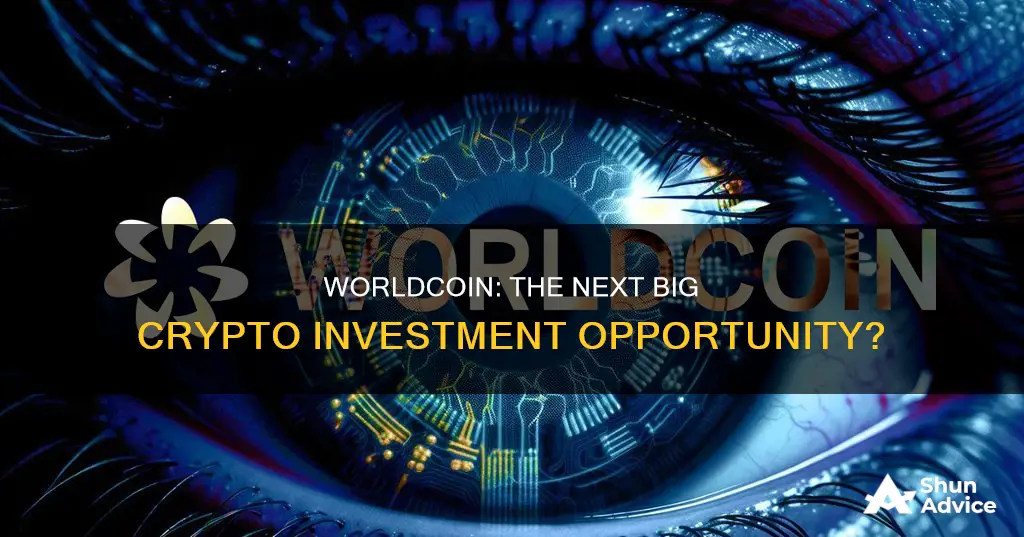
Worldcoin is a cryptocurrency project that claims to be building an economic system that is universally accessible from anywhere in the world. The project could also implement a form of UBI (universal basic income). The Worldcoin token (WLD) is issued on Optimism, a layer 2 scaling solution built on top of Ethereum. Worldcoin's proof of personhood system aims to ensure that every participant is a real person and not a bot or AI agent. Users must scan their eyes with a device called an Orb to obtain a World ID, which serves as a digital passport.
Worldcoin was co-founded by Max Novendstern, Alex Blania, and Sam Altman, who is also the CEO of Chat GPT creator Open AI. The involvement of prominent figures and venture capital investors has raised the profile of Worldcoin. However, it has also faced criticism and regulatory scrutiny over privacy concerns and data collection practices.
While Worldcoin has the potential to revolutionise the crypto space, it is essential to carefully consider the risks and conduct thorough research before investing.
| Characteristics | Values |
|---|---|
| Launch Date | 24th July 2023 |
| Founders | Sam Altman, Alex Blania, Max Novendstern |
| Token | WLD |
| Circulating Supply | 350.22M |
| Current Market Cap | $512.40M USD |
| 24-hour Trading Volume | $101.83M USD |
| Current Price | $1.463074 per (WLD / USD) |
| Price Change (24hr) | -7.67% |
| Available On | Binance, OKX, KuCoin, Huobi |
| Payment Methods | Debit/Credit Card, Google Pay, Apple Pay, Third-Party Payment |
What You'll Learn

Worldcoin's unique proof of personhood system
At the heart of Worldcoin's proof of personhood system is the Orb, a sphere-shaped device that scans a user's iris to generate a unique identification code called an IrisCode. The Orb uses the unique structure of the human eye, similar to fingerprints, to create this code. The iris scan is then rendered down to a compact format and hashed with a one-way hash, ensuring that the original scan cannot be recreated from the hash. The Orb also scans a QR code from the user's wallet to associate the scan with their keys.
The iris scan and associated data are then sent to the Worldcoin blockchain, which runs on Ethereum using the Semaphore zero-knowledge protocol. This protocol validates membership in the set of verified humans without revealing the underlying data. If the iris scan is sufficiently distinct from others, it is added to the set of accepted humans. The blockchain ensures that the identification codes cannot be duplicated or spoofed, preventing false identities and fraud.
Once a person's humanness is verified, they receive a fully-verified World ID on a compatible digital wallet, such as the World App. The World ID functions as a digital "passport" that can be used to privately prove a person's uniqueness and humanness online. This privacy is maintained through the use of zero-knowledge proofs (ZKP), which prevent third parties from accessing a person's World ID public key or tracking them across applications. ZKPs also protect the use of World ID from being tied to the iris scan or any other data used in its creation.
Overall, Worldcoin's proof of personhood system offers a novel approach to identity management and authentication, leveraging blockchain, AI, and biometrics to create a secure and decentralized system. While it has faced some criticism and privacy concerns, it has also garnered attention and interest due to its potential to revolutionize the way we verify identity and access online services.
Is Bitcoin a Safe Investment?
You may want to see also

Worldcoin's global digital passport
Worldcoin has launched its core offering, the "World ID", a unique "digital passport" that serves as a form of identification. This digital passport is verified through iris scans, distinguishing real humans from AI bots online. The project, co-founded by OpenAI CEO Sam Altman, aims to provide a verified digital identity and a cryptocurrency token, WLD, along with a crypto wallet app.
The World ID is a more private, sovereign, and open protocol. It is built on the belief that privacy is a fundamental human right and that individuals should own their identities. The protocol lives on users' devices, allowing only the user to access, control, or delete their information.
The World ID's main verification method is through an in-person iris scan using Worldcoin's innovative device, the "Orb". This bowling ball-sized orb scans an individual's iris, confirming their identity and generating a unique World ID. The iris pattern is unique to each person, much like fingerprints, and the Orb uses its structure to create a unique identification code called an IrisCode. The code is not associated with any personal information and exists solely to prevent duplicate World IDs.
The World ID 2.0 protocol update includes integrations with tech firms and a new verification system. It introduces the concept of World ID apps, allowing users to integrate their World ID with their favourite apps, such as Reddit, Shopify, Minecraft, and Telegram. Additionally, there are now three different levels of verification, accommodating a wider range of applications and security needs.
The World App serves as the repository for the World ID and provides access to decentralised finance applications. It functions as a crypto wallet, storing user credentials for verification on third-party applications. The app can also hold Bitcoin, Ethereum, and USDC, with plans to support more cryptocurrencies in the future.
The Worldcoin project emphasises the privacy and security of user data. The scans taken by Orbs are immediately deleted after generating the IrisCode, and all personal data shared with Worldcoin is encrypted. This digital passport system, using cryptographic and blockchain tools, aims to provide a secure and globally accessible economic system.
Bitcoin's Global Love Affair: Country-Wise Investment Insights
You may want to see also

Worldcoin's tokenomics
The Worldcoin (WLD) token is the native cryptocurrency of the Worldcoin platform and has a total supply capped at 10 billion tokens for 15 years, after which the governance of the network can decide to implement an inflation rate of up to 1.5%. The WLD token serves as a utility and future governance token on the platform, enabling users to access the global economy and participate in democratic processes.
The token distribution of Worldcoin has been a subject of concern, with early investors and insiders receiving significant allocations at discounted prices. Approximately 75% of the tokens have been earmarked for the community, while the remaining 25% is allocated to investors, the initial development team, and reserves. The unlock schedule for these tokens varies, with some allocations unlocking gradually over the next few years. This has raised concerns about potential selling pressure and its impact on the token's price action.
AI Coin Investment: Best Options for Your Portfolio
You may want to see also

Worldcoin's privacy concerns
Worldcoin, the cryptocurrency project founded by Sam Altman, Max Novendstern, and Alex Blania, has faced scrutiny and skepticism from privacy experts and regulators worldwide. The project's unique proof of personhood system, which uses iris scans to create biometric identifiers, has raised concerns about the privacy and security of user data.
One of the main concerns is the sensitivity of the data being collected. Worldcoin's "Orbs" collect data by taking images of a person's iris, which is considered biometric data. This type of data is highly sensitive and protected under the European Union's General Data Protection Regulation (GDPR). The Spanish Data Protection Agency (AEPD) and the Bavarian State Office for Data Protection Supervision (BayLDA) have both taken action against Worldcoin, citing concerns about the collection and processing of personal data. The AEPD ordered Worldcoin to temporarily stop collecting and processing personal data in Spain, while the BayLDA investigated the company over concerns about biometric data collection.
Privacy experts worry that Worldcoin could be a target for criminals, similar to data thefts at other large companies. They argue that the company may use the collected data for purposes other than identification, such as personalized marketing. There are also concerns about the company's data protection practices, with the AEPD receiving complaints related to the level of information provided about data processing, the collection of data from minors, and the lack of ability to withdraw consent for data sharing.
In addition to regulatory scrutiny, Worldcoin has faced criticism from the crypto community and negative attention from regulators in several countries. The government of Kenya ordered Worldcoin to stop onboarding new users, and regulators in France and the United Kingdom have expressed serious concerns. Despite these challenges, Worldcoin has been working towards compliance with local privacy laws and claims that its operations preserve user privacy.
Why You Should Consider Investing in Bitcoin Investment Trust
You may want to see also

Worldcoin's regulatory issues
Worldcoin has faced regulatory issues in several jurisdictions, including Hong Kong, Portugal, Spain, Germany, and Austria. The project has been scrutinized due to concerns about the handling of biometric data and privacy protection.
In Hong Kong, the Office of the Privacy Commissioner for Personal Data (PCPD) directed Worldcoin to cease operations, citing risks to privacy and personal data. The PCPD found that Worldcoin's collection of iris and face images was "unnecessary and excessive." Despite Worldcoin's assertions of compliance with local laws, the company was required to halt its activities in Hong Kong.
Similarly, in Spain, Worldcoin has temporarily halted its operations due to regulatory concerns. The Bavarian State Office for Data Protection Supervision (BayLDA) in Germany also investigated Worldcoin over data protection and privacy issues. In addition, Worldcoin encountered regulatory issues in Portugal and Austria, although the specific details of these cases are not mentioned.
Worldcoin has been working towards addressing these regulatory challenges and has taken steps to enhance the security and privacy of its users' data. They have introduced a Secure Multi-Party Computation (SMPC) system, which encrypts and decentralizes biometric data, including iris scans. This system aims to protect users' privacy and prevent data breaches.
However, despite their efforts to comply with regulatory frameworks, Worldcoin continues to face scrutiny and skepticism from regulators and privacy advocates. There are concerns about the potential for misuse of the database and the collection, storage, and use of personal data. Worldcoin's ambitious plans for a global identity and financial network have drawn criticism, particularly in European countries.
The Next Bitcoin: Will We Ever See Similar Growth?
You may want to see also
Frequently asked questions
Worldcoin is available to buy and sell on several major exchanges, including Binance, OKX, KuCoin and Huobi. You can also buy Worldcoin with a debit or credit card, or with Google Pay or Apple Pay.
Worldcoin is a cryptocurrency project that claims to be building an economic system that is universally accessible from anywhere in the world. It is decentralised, meaning decisions are made by users and not a centralised entity, such as a bank. It also has a unique proof of personhood system, which uses iris scans to verify that every participant in Worldcoin is a real person and not a bot or artificial intelligence agent.
Worldcoin is a very unique crypto project, and there is nothing quite like it on the market. It could potentially enable a form of UBI (universal basic income), which could massively increase the adoption of Worldcoin. Sam Altman, the co-founder of Worldcoin, is also the CEO of Chat GPT creator Open AI, which has significantly raised the profile of the project. However, Worldcoin has seen a hostile reception from a sizeable part of the crypto community due to privacy concerns. It has also drawn negative attention from regulators in several countries, including Kenya, France and the United Kingdom.







